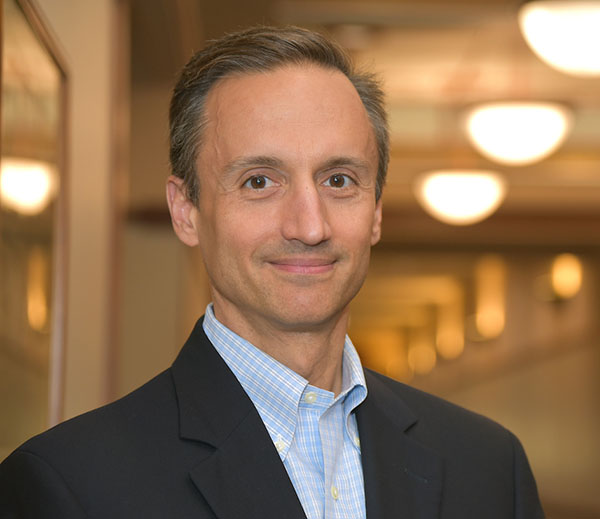
One of the world's leading experts on health economics,
Anthony LoSasso is a Double Demon who graduated from DePaul with bachelor's and master's degrees in economics. In 1996, he received his PhD in economics from Indiana University Bloomington. His academic career began at Rutgers University in New Jersey as an assistant research professor. He moved to Northwestern University as a research assistant professor in the Institute for Health Services Research and Policy Studies. He then joined the University of Illinois at Chicago as an associate professor (and, later, as professor) in the Health Policy and Administration Division in the School of Public Health.
His research spans several dimensions of health and labor economics, health policy and health services research, and has explored the impact of health insurance benefit design on healthcare utilization and health of enrollees. Below, we talked to LoSasso about his new appointment as a professor of economics and Driehaus Fellow at the Driehaus College of Business.
Why did you want to come to DePaul?
Primarily because I think there are incredibly exciting opportunities to build programs focused on the health care sector — from both an educational and a research standpoint. The Department of Economics has a fantastic structure in place with its
MS in Economics and Policy Analysis program. Building on this successful program to potentially create a health economics and policy-focused degree could open up a whole new set of possibilities for students.
The secondary reason is that I had a wonderful experience as an undergrad and graduate student at DePaul, and the Economics Department specifically, that I couldn't resist the opportunity to return and try to give back to the university and the students.
As a Double Demon alumnus, what is it like coming back to DePaul? How has the Department of Economics changed (or not changed)?
I had a wonderful experience at DePaul as a student. A lot has changed, but even more has stayed the same. The building and the environment is completely different — and beautiful! It was a little grungy back in the late-80s and early 90s. The same can be said of the south end of the Loop. But it's delightful now.
What hasn't changed are a lot of the faculty who taught me economics. I was Tony Krautmann's research assistant almost 30 years ago. What also hasn't changed is the incredibly high degree of caring that goes into the teaching of economics.
Why should students study health economics right now?
Oh my gosh, economics is just fundamental to how the world works. Why wouldn't anyone want to know about that? But seriously, whether the conversation is about government policy or private parties working together in a business setting, economics governs so much of the behavior observed. And it all boils down to incentives and the role they play in influencing how people act and respond in different circumstances. Economics is, at its root, the study of how people respond to incentives.
What courses are you teaching at DePaul?
I am teaching Health Economics at the undergraduate level this fall. In the spring I will be fielding two new courses aimed at MS students: a third course in the econometrics sequence, which will focus on causal inference methods, and an advanced health economics and policy course. I can't wait to meet the students!
What skills are most important for economics students interested in a career in the healthcare industry?
It's really threefold: first, there are the highly complex institutional arrangements that govern the health care sector. There is an alphabet soup of acronyms. There are government programs and private programs. For profit and nonprofit entities. It's all very complicated and can seem daunting. So demystifying all that is important. Second, understanding the ways in which economics applies to the healthcare world is critical. Insurance and uncertainty are central issues, as well as key concepts from industrial organization economics. Finally, gaining facility with the types of data used in health care settings is an important skill. Large, unwieldy administrative databases are common. Using these data requires care, patience and skill.